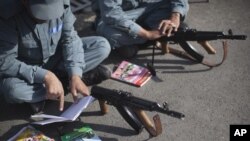The transition process continues apace in Afghanistan: as the NATO-led International Security Assistance Force, or ISAF, slowly draws down its troop levels, more and more responsibility falls to Afghanistan’s own armed forces. That was always the plan, and it is proceeding on schedule, said NATO Secretary-General Anders Fogh Rasmussen: "The handover to Afghan security responsibility is unfolding as planned. And as transition takes hold, you will see some of our forces redeploying or drawing down as part of the strategy we have all agreed."
Nearly three years ago, President Barack Obama committed to the fight in Afghanistan an additional 33,000 U.S. troops, the so-called surge, which allowed ISAF to slowly cede greater responsibility to Afghanistan’s own forces. “The surge accomplished the primary objectives of reversing the Taliban’s momentum on the battlefield and dramatically increased the size and capability of the Afghan national security forces,” said U.S. Secretary of Defense Leon Panetta.
The surge ended in September, and the last of the surge troops returned home. But that still leaves 68,000 U.S. soldiers in Afghanistan. Their job is to help train their Afghan counterparts, so they can take full responsibility for Afghanistan’s security once NATO ends combat operations in Afghanistan at the end of 2014.
“We’ve invested a great deal in helping develop Afghan security forces. Now, we must do everything we can to help them successfully transition and take the lead for security throughout all of Afghanistan as planned next year,” said Secretary Panetta.
Today, 90 percent of all operations within the country are carried out by teams that partner Afghan policemen or soldiers with NATO troops.
“Our goal, frankly, is to try to develop their enabling capability as well, to be able to do . . . . all of the . . . .support systems that are critical to them providing full security for their country in the future,” said Secretary of Defense Panetta.
“We, the defense leaders of this historic alliance, preserve a legacy of mutual determination and sacrifice in the face of danger and difficulty. By uniting our powers to finish the long fight in Afghanistan, we will honor that legacy and pass it intact to future generations in the North Atlantic area and beyond.”
Nearly three years ago, President Barack Obama committed to the fight in Afghanistan an additional 33,000 U.S. troops, the so-called surge, which allowed ISAF to slowly cede greater responsibility to Afghanistan’s own forces. “The surge accomplished the primary objectives of reversing the Taliban’s momentum on the battlefield and dramatically increased the size and capability of the Afghan national security forces,” said U.S. Secretary of Defense Leon Panetta.
The surge ended in September, and the last of the surge troops returned home. But that still leaves 68,000 U.S. soldiers in Afghanistan. Their job is to help train their Afghan counterparts, so they can take full responsibility for Afghanistan’s security once NATO ends combat operations in Afghanistan at the end of 2014.
“We’ve invested a great deal in helping develop Afghan security forces. Now, we must do everything we can to help them successfully transition and take the lead for security throughout all of Afghanistan as planned next year,” said Secretary Panetta.
Today, 90 percent of all operations within the country are carried out by teams that partner Afghan policemen or soldiers with NATO troops.
“Our goal, frankly, is to try to develop their enabling capability as well, to be able to do . . . . all of the . . . .support systems that are critical to them providing full security for their country in the future,” said Secretary of Defense Panetta.
“We, the defense leaders of this historic alliance, preserve a legacy of mutual determination and sacrifice in the face of danger and difficulty. By uniting our powers to finish the long fight in Afghanistan, we will honor that legacy and pass it intact to future generations in the North Atlantic area and beyond.”




